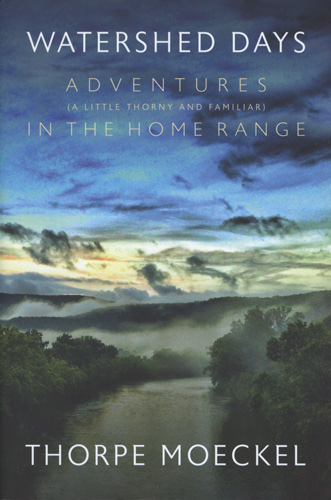Watershed Days

Adventures (a Little Thorny and Familiar) in the Home Range
Thorpe Moeckel
April 2015
Scott Russell Morris
I love essays, especially the ones that don’t claim anything amazing about themselves, that stick to the quotidian and spend less time exploring stories than thoughts on lives being lived. But there is a danger in reading these sort of quiet, contemplative collections of essays: by the end you feel like you are best friends with the authors. You seem to know all their fears, cares, secret pleasures, weaknesses. You put down the book thinking you could probably buy them the perfect birthday present. But, of course, you don’t really know them and they don’t know you. I love essays, especially the ones that don’t claim anything amazing about themselves, that stick to the quotidian and spend less time exploring stories than thoughts on lives being lived. But there is a danger in reading these sort of quiet, contemplative collections of essays: by the end you feel like you are best friends with the authors. You seem to know all their fears, cares, secret pleasures, weaknesses. You put down the book thinking you could probably buy them the perfect birthday present. But, of course, you don’t really know them and they don’t know you.
So it was bittersweet when I finished and put down Thorpe Moeckel’s Watershed Days: Adventures (a Little Thorny and Familiar) in the Home Range, a collection of narrative essays about his life as an amateur homesteader in Virginia and his adventures on and around the local waters. As the subtitle suggests—little, familiar—it is an unassuming collection, and as with many of the best essays, not one about large events or important ideas. “What happened next matters little to the history of the world; I paddled downstream,” he says in one of his many river essays. “There were cliffs on the river right and mist like sponges wiping the ridges further up.” The pleasure of the book is, instead, seeing a wise mind contemplating a pleasant, quiet life interrupted by solitary adventures. His essays are filled with enthusiasm—if the subtitle weren’t already so long, enthusiasms might be something to work in. These enthusiasms trip over themselves, vying for attention, which Moeckel, always quick to observe, recognizes: “It is sad when one’s enthusiasms take the back seat to one’s other enthusiasms, but so it goes.”
There is not an essay in the collection that doesn’t mention some adventure, some way of experiencing the world in a physical way: skateboarding, surfing, trespassing on National Park land, making apple butter, hunting, tracing lines in his daughter’s back and telling her stories at bedtime, and swimming in the creeks. But the pleasure for the reader is intensified not because we are just given idyllic scenes—though there are long passages of them—but because we see Moeckel in his weaknesses too, when he is not always content, not always charmed by the sublimity of nature, and though he is dedicated to the cause of the homesteader, he is still human, which we see glimpses of in his using one hobby to avoid another, in his occasionally flippant attitudes to his daughter and wife, in his acknowledgement of small troubles at work and in the extended family:
I can’t tell you what sort of birds are audible while rigging rod and reel, but their noise sets off many flares. They remind me of the prior night, watching a bat do what bats do in crazy waves twenty feet above the wellhead, near where we’ll be stringing a fence soon to keep chickens, rabbits, and whatever else out of the garden beds. We moved to this place with big plans last July, and I’m still learning how to be elegant about balancing a need to explore with a need to settle in. I expect to be sneaking off from farm chores twenty years from now, if we make it that long.
Later on, he admits to this impatience even more explicitly:
Many days I am too restless to be anything more than a haphazard homesteader. As much as I love our animals and plants, the food and care they provide, I often grow claustrophobic at the routine, in and out of gates, fences, the regular milking, waterings, feedings, repairs.
But these moments of emotional contrariness are few and far between; enthusiasm is really the main mood of the essays, making them a description of ideal living. We readers know that we’re only getting the stories Moeckel is most excited about, but even knowing that, the book clearly makes a case for the simple, intentional, mindful life. There is an attention to the senses, to the feel of the body in motion, to the source of sustenance that all readers and writers could learn from, no matter what their subject. Readers will remember that no matter what their enthusiasm, there is pleasure in doing it well, in paying attention:
I get a deeper pleasure paddling a river when I know its headwaters. I suspect it’s like drinking wine, the grapes of which you’ve had a hand in raising and gathering. It’s not ownership I’m after, just care, patience, nuance—a well-rounded sense of time, gravity, gradient, flow.
Watershed Days is a slow, contemplative collection, in no way a page turner, but at the same time, I left almost every one of the twenty-four essays thinking, “That one was my favorite so far,” and so it built until the last, quietly, carefully, like a river “gathering tributaries as people do experiences, but with a quieter sort of grace.”




